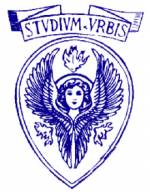The Sapienza University of Rome, officially Sapienza – Università di Roma, also called simply Sapienza formerly known as Università degli studi di Roma "La Sapienza", is a coeducational, autonomous state university in Rome, Italy. It is the largest Italian university by enrollment and the oldest of Rome's four state-funded universities. In Italian, sapienza means "wisdom" or "knowledge".
In 2010 QS World University Rankings ranked the university 190th overall in the world.
History
Sapienza University of Rome was founded in 1303 with the Papal bull In supremae praeminentia dignitatis issued on 20 April 1303 by Pope Boniface VIII, as a Studium for ecclesiastical studies more under his control than the universities of Bologna and Padua.
In 1431 Pope Eugene IV completely reorganized the studium with the bull In supremae, in which he granted masters and students alike the broadest possible privileges and decreed that the university should include the four schools of Law, Medicine, Philosophy and Theology. He introduced a new tax on wine in order to raise funds for the university; the money was used to buy a palace which later housed the Sant'Ivo alla Sapienza church.
However, the University's days of splendour came to an end during the sack of Rome in 1527, when the studium was closed and the professors dispersed; some were killed. Pope Paul III restored the university shortly after his ascension to the pontificate in 1534.
In the 1650s the university became known as Sapienza, meaning wisdom, a title it retains. In 1703, Pope Clement XI purchased some land with his private funds on the Janiculum, where he made a botanical garden, which soon became the most celebrated in Europe through the labours of the Trionfetti brothers.
University students were newly animated during the 19th-century Italian revival. In 1870, La Sapienza stopped being the papal university and became the university of the capital of Italy. In 1935 the new university campus, planned by Marcello Piacentini, was completed.
Campuses
Sapienza University has many campuses in Rome but its main campus is the Città Universitaria (University city), which covers 439,000 m2 (4,730,000 sq ft) near Termini Station. The university has some satellite campuses outside Rome, the main of which is in Latina.
In 2011 a project was launched to build a campus with residence halls near Pietralata station, in collaboration with the Lazio region. In order to cope with the ever-increasing number of applicants, the Rector has also approved a new plan to expand the Città Universitaria, reallocate offices and enlarge faculties, as well as create new campuses for hosting local and foreign students.
The Alessandrina University Library (Biblioteca Universitaria Alessandrina), built in 1667 by Pope Alexander VII, is the main library housing 1.5 million volumes; it has some important collections including collezione ciceroniana, Fondo Festa, etc.
Academics
Since the 2011 reform, Sapienza University of Rome has eleven faculties and 65 departments. Today Sapienza, with 140,000 students and 8,000 among academic and technical and administrative staff, is the largest university in Italy.
The university has significant research programmes in the fields of engineering, natural sciences, biomedical sciences and humanities.
Nepotism allegation
Rector Luigi Frati has come under fire for nepotism because of three members of his family holding chairs at the university. According to a BBC report: "Professor Frati has [...] overseen the promotion of his wife from being a local high school history teacher, to becoming Professor of Medical History. His daughter also gained a post as Professor of Legal Medicine - without any specific medical education. And his son was made an associate professor in cardiology aged just 31, one of the youngest Italians to gain such an appointment." Local media organisations have called the scandal "Parentopoli" - "Relative-gate".
Admission
In order to cope with the large demand for admission to the university courses, some faculties hold a series of entrance examinations. The entrance test often decides which candidates will have access to the undergraduate course. For some faculties, the entrance test is only a means through which the administration acknowledges the students' level of preparation. Students that do not pass the test can still enroll in their chosen degree courses but have to pass an additional exam during their first year.
Controversies
In 1990, Pope John Paul II faced small protests in his only visit to La Sapienza.
On January 15, 2008 the Vatican cancelled a planned visit to La Sapienza University by Pope Benedict XVI who was to speak at the university ceremony launching the 2008 academic year due to protests by some students and professors. The title of speech should have been 'The Truth Makes Us Good and Goodness is Truth'. Some students and professors protested in reaction to a 1990 speech that Pope Benedict XVI (then Cardinal Joseph Ratzinger) gave in which he, in their opinion, endorsed the actions of the church against Galileo in 1633.
Other controversies include the murder of Professor Ezio Tarantelli in 1985, the murder of Marta Russo in 1997, the "Law School scandal" in 2003, the "Parentopoli scandal" in 2010 and the award given to Muammar Gaddafi on June 10, 2009 (Medaglia d'Oro dell'Università degli Studi di Roma "La Sapienza"). This award is an institutional gift given by Sapienza to foreign authorities visiting the University. During his visit, Gaddafi participated in a meeting with Sapienza's students, where he was asked about a number of controversial aspects regarding Libya's political choices, such as human rights of migrants, gender equality and free elections.


























